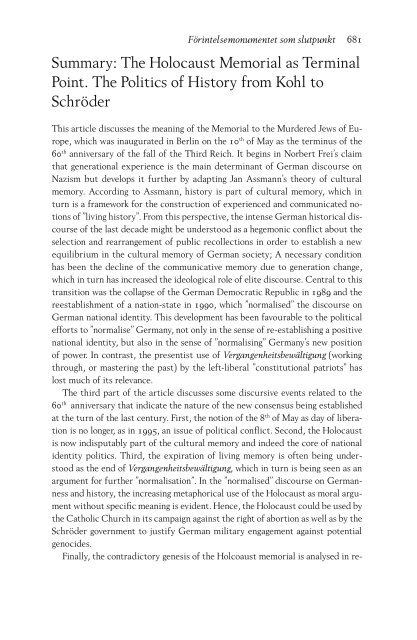Förintelsemonumentet som slutpunkt. Tysk historiepolitik från Kohl ...
Förintelsemonumentet som slutpunkt. Tysk historiepolitik från Kohl ...
Förintelsemonumentet som slutpunkt. Tysk historiepolitik från Kohl ...
You also want an ePaper? Increase the reach of your titles
YUMPU automatically turns print PDFs into web optimized ePapers that Google loves.
<strong>Förintelsemonumentet</strong> <strong>som</strong> <strong>slutpunkt</strong><br />
Summary: The Holocaust Memorial as Terminal<br />
Point. The Politics of History from <strong>Kohl</strong> to<br />
Schröder<br />
681<br />
This article discusses the meaning of the Memorial to the Murdered Jews of Europe,<br />
which was inaugurated in Berlin on the 10 th of May as the terminus of the<br />
60 th anniversary of the fall of the Third Reich. It begins in Norbert Frei’s claim<br />
that generational experience is the main determinant of German discourse on<br />
Nazism but develops it further by adapting Jan Assmann’s theory of cultural<br />
memory. According to Assmann, history is part of cultural memory, which in<br />
turn is a framework for the construction of experienced and communicated notions<br />
of ”living history”. From this perspective, the intense German historical discourse<br />
of the last decade might be understood as a hegemonic conflict about the<br />
selection and rearrangement of public recollections in order to establish a new<br />
equilibrium in the cultural memory of German society; A necessary condition<br />
has been the decline of the communicative memory due to generation change,<br />
which in turn has increased the ideological role of elite discourse. Central to this<br />
transition was the collapse of the German Democratic Republic in 1989 and the<br />
reestablishment of a nation-state in 1990, which ”normalised” the discourse on<br />
German national identity. This development has been favourable to the political<br />
efforts to ”normalise” Germany, not only in the sense of re-establishing a positive<br />
national identity, but also in the sense of ”normalising” Germany’s new position<br />
of power. In contrast, the presentist use of Vergangenheitsbewältigung (working<br />
through, or mastering the past) by the left-liberal ”constitutional patriots” has<br />
lost much of its relevance.<br />
The third part of the article discusses <strong>som</strong>e discursive events related to the<br />
60 th anniversary that indicate the nature of the new consensus being established<br />
at the turn of the last century. First, the notion of the 8 th of May as day of liberation<br />
is no longer, as in 1995, an issue of political conflict. Second, the Holocaust<br />
is now indisputably part of the cultural memory and indeed the core of national<br />
identity politics. Third, the expiration of living memory is often being understood<br />
as the end of Vergangenheitsbewältigung, which in turn is being seen as an<br />
argument for further ”normalisation”. In the ”normalised” discourse on Germanness<br />
and history, the increasing metaphorical use of the Holocaust as moral argument<br />
without specific meaning is evident. Hence, the Holocaust could be used by<br />
the Catholic Church in its campaign against the right of abortion as well as by the<br />
Schröder government to justify German military engagement against potential<br />
genocides.<br />
Finally, the contradictory genesis of the Holcoaust memorial is analysed in re-
















